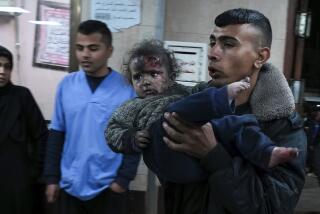Maliki unveils effort to end bloodshed
- Share via
BAGHDAD — Iraqi soldiers killed 30 suspected insurgents in a furious gun battle Saturday in downtown Baghdad, authorities said, in what appeared to be the opening salvo of a new plan by Prime Minister Nouri Maliki to secure the capital.
Maliki announced the new effort to end bloodshed in Baghdad on Saturday, five months after the U.S. military launched a plan to quell sectarian fighting that is widely regarded as a failure. Killings have steadily increased in the capital as insurgents and Shiite Muslim militia death squads continue to operate with impunity.
Maliki’s speech, to commemorate Iraqi Army Day, took place on a day when at least 71 corpses were found in the streets of Baghdad, one of the largest such discoveries in a civil war in which scores of bodies turn up daily.
Most of the victims had been bound, blindfolded, tortured and executed with gunshots to the chest or head. Twenty-seven of the bodies were found near the Sheik Omar cemetery, a Sunni Arab burial ground in downtown Baghdad. Some of the victims had been strangled.
Many of the dead were presumed to be the victims of Shiite death squads, police sources said.
Maliki said that he would crack down on Sunni Arab and Shiite militants with equal vigor.
“The Baghdad Security Strategy will not be a shelter to the outlaws regardless of their political or religious affiliation, and we shall punish anyone who thwarts the strategy or presses their sectarian or partisan agenda,” he said.
Shortly after Maliki’s address, Iraqi soldiers fought with suspected insurgents in downtown Baghdad. The gun battle took place on Haifa Street, a road that some U.S. soldiers call “Sniper Alley” because of the large number of attacks that have taken place there.
Maliki revealed little about the new plan except that the military would have the main responsibility, a shift from the previous operation, which relied on police officers. Iraq’s police forces are widely believed to have compromised the U.S. plan to quell sectarian fighting.
The old plan called for U.S. and Iraqi forces to clear the capital, neighborhood by neighborhood. Once an area was cleared of insurgents and militia fighters, Iraqi police were supposed to take over.
But Shiite militiamen in the police forces were accused of collaborating with death squads and implicated in killings of Sunni Arabs in “cleared” areas. The entire 8th Brigade of the national police was suspended after witnesses reported that men in police uniforms raided a meat-processing plant in October and kidnapped 26 Sunni Arab workers.
Sunni Arabs also complained that the security plan seemed to focus more attention on their communities than on Shiite militia strongholds such as Baghdad’s Sadr City. Maliki criticized early U.S. incursions into the area. His Shiite alliance consists of political parties with armed militias.
The Iraqi army is believed to be less sectarian than the police, but it too has faced accusations of Shiite dominance. U.S. military commanders in Diyala province exerted more control over the Iraqi army’s 5th Division in October after that Shiite-dominated force conducted abusive, arbitrary sweeps of Sunni Arab neighborhoods. Shiite-dominated Iraqi army units also have been accused of human rights abuses in towns such Fallouja and Rutbah in Al Anbar province.
Maliki also said he would fight joblessness “through public- and private-sector reconstruction,” and he renewed his call for negotiations to bring Sunni Arab militants into the political process.
“Let’s fold up the black past and work together to build a free, democratic and diverse Iraq without discrimination or marginalization,” Maliki said.
The prime minister’s speech appeared to dovetail with discussions in the Bush administration about increasing the number of U.S. troops to help secure Baghdad and other problem areas.
The Bush administration also is likely to propose a new reconstruction package focusing on creating jobs and refurbishing mothballed factories.
In many areas throughout central and western Iraq, poor security has brought industry to a standstill.
Maliki also called on Iraq’s parliament to attend to pressing constitutional issues, oversight of anti-corruption agencies and the controversial de-Baathification effort, which left thousands of former regime members without jobs.
But parliament has not achieved a quorum in five weeks and is scheduled to take a recess after it completes Iraq’s annual budget.
Maliki also used his speech to rebuff critics of the hanging of Saddam Hussein a week earlier. Shiite guards were recorded on a camera phone jeering and cursing the former Iraqi president as he stood on the gallows with a noose around his neck. Sunni Arab leaders in the Middle East criticized Maliki’s decision to execute Hussein on a Muslim holiday.
“These countries know very well that Saddam trampled over everything holy and divine,” Maliki said. “We see such behavior as provocative and interference in the internal matters of Iraq and an insult to the feelings of Saddam’s victims.”
The execution of two of Hussein’s former aides is expected to take place soon.
Meanwhile, bloodshed continued in Iraq. In northeast Baghdad, gunmen stormed the home of a police colonel and killed his wife, four children and three other relatives.
U.S. soldiers killed four suspected insurgents during a Baghdad raid, the military announced.
A car bomb in the Baghdad neighborhood of Dora killed three people, and gunmen in Yarmouk killed the driver of Iraq’s minister of higher education. A car bomb targeting the director of Baghdad’s Emergency Police killed a bystander.
In the southern port city of Basra, two Iraqis were found dead near a soccer stadium. Police said they were investigating to determine whether the men were the interpreters kidnapped along with an American on Friday near Basra.
moore1@latimes.com
Times special correspondents in Baghdad, Hillah and Kirkuk contributed to this report.
More to Read
Sign up for Essential California
The most important California stories and recommendations in your inbox every morning.
You may occasionally receive promotional content from the Los Angeles Times.












